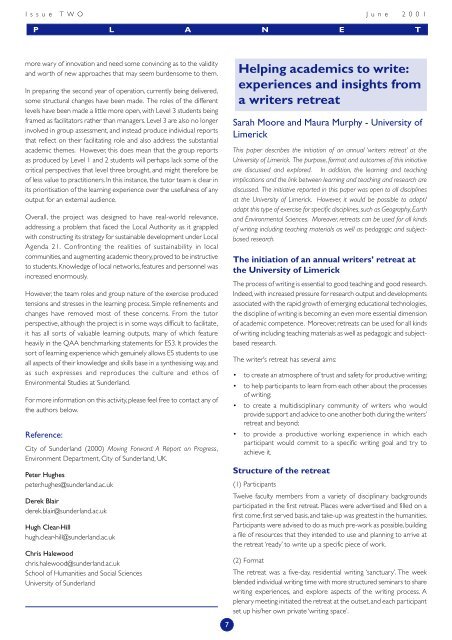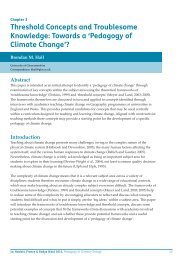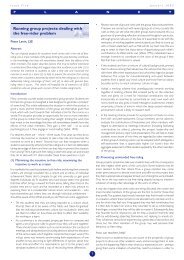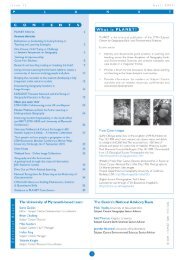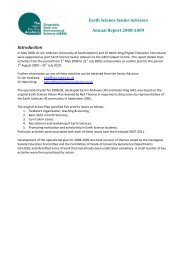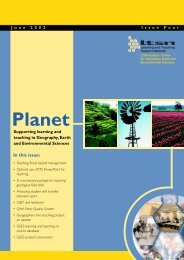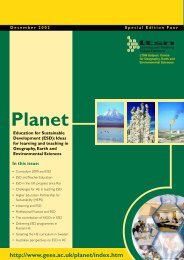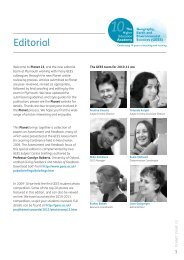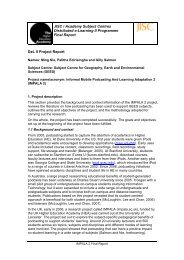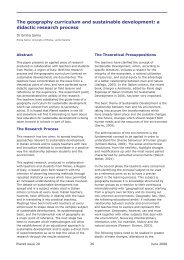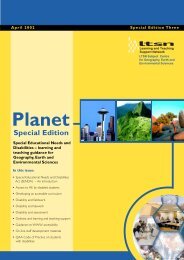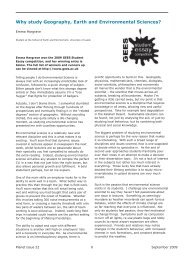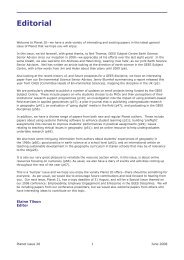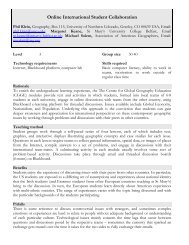Helping academics to write - GEES Subject Centre Home
Helping academics to write - GEES Subject Centre Home
Helping academics to write - GEES Subject Centre Home
You also want an ePaper? Increase the reach of your titles
YUMPU automatically turns print PDFs into web optimized ePapers that Google loves.
Issue TWO June 2001<br />
P L A N E T<br />
more wary of innovation and need some convincing as <strong>to</strong> the validity<br />
and worth of new approaches that may seem burdensome <strong>to</strong> them.<br />
In preparing the second year of operation, currently being delivered,<br />
some structural changes have been made. The roles of the different<br />
levels have been made a little more open, with Level 3 students being<br />
framed as facilita<strong>to</strong>rs rather than managers. Level 3 are also no longer<br />
involved in group assessment, and instead produce individual reports<br />
that reflect on their facilitating role and also address the substantial<br />
academic themes. However, this does mean that the group reports<br />
as produced by Level 1 and 2 students will perhaps lack some of the<br />
critical perspectives that level three brought, and might therefore be<br />
of less value <strong>to</strong> practitioners. In this instance, the tu<strong>to</strong>r team is clear in<br />
its prioritisation of the learning experience over the usefulness of any<br />
output for an external audience.<br />
Overall, the project was designed <strong>to</strong> have real-world relevance,<br />
addressing a problem that faced the Local Authority as it grappled<br />
with constructing its strategy for sustainable development under Local<br />
Agenda 21. Confronting the realities of sustainability in local<br />
communities, and augmenting academic theory, proved <strong>to</strong> be instructive<br />
<strong>to</strong> students. Knowledge of local networks, features and personnel was<br />
increased enormously.<br />
However, the team roles and group nature of the exercise produced<br />
tensions and stresses in the learning process. Simple refinements and<br />
changes have removed most of these concerns. From the tu<strong>to</strong>r<br />
perspective, although the project is in some ways difficult <strong>to</strong> facilitate,<br />
it has all sorts of valuable learning outputs, many of which feature<br />
heavily in the QAA benchmarking statements for ES3. It provides the<br />
sort of learning experience which genuinely allows ES students <strong>to</strong> use<br />
all aspects of their knowledge and skills base in a synthesising way, and<br />
as such expresses and reproduces the culture and ethos of<br />
Environmental Studies at Sunderland.<br />
For more information on this activity, please feel free <strong>to</strong> contact any of<br />
the authors below.<br />
Reference:<br />
City of Sunderland (2000) Moving Forward: A Report on Progress,<br />
Environment Department, City of Sunderland, UK.<br />
Peter Hughes<br />
peter.hughes@sunderland.ac.uk<br />
Derek Blair<br />
derek.blair@sunderland.ac.uk<br />
Hugh Clear-Hill<br />
hugh.clear-hill@sunderland.ac.uk<br />
Chris Halewood<br />
chris.halewood@sunderland.ac.uk<br />
School of Humanities and Social Sciences<br />
University of Sunderland<br />
7<br />
<strong>Helping</strong> <strong>academics</strong> <strong>to</strong> <strong>write</strong>:<br />
experiences and insights from<br />
a <strong>write</strong>rs retreat<br />
Sarah Moore and Maura Murphy - University of<br />
Limerick<br />
This paper describes the initiation of an annual ‘<strong>write</strong>rs retreat’ at the<br />
University of Limerick. The purpose, format and outcomes of this initiative<br />
are discussed and explored. In addition, the learning and teaching<br />
implications and the link between learning and teaching and research are<br />
discussed. The initiative reported in this paper was open <strong>to</strong> all disciplines<br />
at the University of Limerick. However, it would be possible <strong>to</strong> adopt/<br />
adapt this type of exercise for specific disciplines, such as Geography, Earth<br />
and Environmental Sciences. Moreover, retreats can be used for all kinds<br />
of writing including teaching materials as well as pedagogic and subjectbased<br />
research.<br />
The initiation of an annual <strong>write</strong>rs’ retreat at<br />
the University of Limerick<br />
The process of writing is essential <strong>to</strong> good teaching and good research.<br />
Indeed, with increased pressure for research output and developments<br />
associated with the rapid growth of emerging educational technologies,<br />
the discipline of writing is becoming an even more essential dimension<br />
of academic competence. Moreover, retreats can be used for all kinds<br />
of writing including teaching materials as well as pedagogic and subjectbased<br />
research.<br />
The <strong>write</strong>r’s retreat has several aims:<br />
• <strong>to</strong> create an atmosphere of trust and safety for productive writing;<br />
• <strong>to</strong> help participants <strong>to</strong> learn from each other about the processes<br />
of writing;<br />
• <strong>to</strong> create a multidisciplinary community of <strong>write</strong>rs who would<br />
provide support and advice <strong>to</strong> one another both during the <strong>write</strong>rs’<br />
retreat and beyond;<br />
• <strong>to</strong> provide a productive working experience in which each<br />
participant would commit <strong>to</strong> a specific writing goal and try <strong>to</strong><br />
achieve it.<br />
Structure of the retreat<br />
(1) Participants<br />
Twelve faculty members from a variety of disciplinary backgrounds<br />
participated in the first retreat. Places were advertised and filled on a<br />
first come, first served basis, and take-up was greatest in the humanities.<br />
Participants were advised <strong>to</strong> do as much pre-work as possible, building<br />
a file of resources that they intended <strong>to</strong> use and planning <strong>to</strong> arrive at<br />
the retreat ‘ready’ <strong>to</strong> <strong>write</strong> up a specific piece of work.<br />
(2) Format<br />
The retreat was a five-day, residential writing ‘sanctuary’. The week<br />
blended individual writing time with more structured seminars <strong>to</strong> share<br />
writing experiences, and explore aspects of the writing process. A<br />
plenary meeting initiated the retreat at the outset, and each participant<br />
set up his/her own private ‘writing space’.
Issue TWO June 2001<br />
P L A N E T<br />
In addition <strong>to</strong> quiet writing time, participants also had the option <strong>to</strong><br />
meet with smaller subgroups <strong>to</strong> help <strong>to</strong> edit or comment on drafts of<br />
each other’s work. Participants gathered at the end of each day for a<br />
shared evening meal. Pre- and post-retreat questionnaires were<br />
distributed <strong>to</strong> all group members <strong>to</strong> get their views about the writing<br />
process and about the possible benefits of participating in the <strong>write</strong>rs’<br />
retreat.<br />
Perspectives on the writing process<br />
(1) Enjoyable aspects of writing<br />
Participants identified a variety of enjoyable dimensions that they<br />
associated with the writing process. Most notably, they referred <strong>to</strong>:<br />
• the sense of achievement and satisfaction engendered by<br />
successful writing;<br />
• the creative, original dimension of writing;<br />
• the durability of their written work;<br />
• the engagement or ‘flow’ associated with their experience of<br />
writing.<br />
(i) Enjoying the sense of achievement<br />
On the sense of achievement associated with writing, one participant<br />
summarised the experience by explaining: ‘I enjoy developing a theme<br />
or idea and following it through. I like developing arguments and<br />
suppositions. I particularly like finishing a piece of work and the sense of<br />
accomplishment that entails’. Another talked about how achievement<br />
is linked with her own expression of ideas: ‘… you’ve shaped it your<br />
way and therefore there’s this feeling of achievement’.<br />
Others referred directly <strong>to</strong> the feeling of having risen <strong>to</strong> challenges<br />
presented by their writing activities, and <strong>to</strong> the experiences of<br />
accomplishment and satisfaction that they associated directly with<br />
the writing process.<br />
(ii) Enjoying the durability of writing<br />
Several respondents referred <strong>to</strong> the importance of having produced<br />
something durable, of ‘making their mark’ as a result of having written<br />
up and published a piece of their work:<br />
‘an important part of my job involves thinking, reflecting, exploring and<br />
testing ideas…. To capture those thoughts and ideas in a coherent piece<br />
of writing that others may read, is extremely motivating and enjoyable’;<br />
‘It’s possible <strong>to</strong> create something that lasts and that others can deal with<br />
at their own pace’.<br />
(iii) Enjoying the originality and creativity of writing<br />
On the originality and creativity associated with writing, participants<br />
said:<br />
‘When something good comes out, you feel like you have given birth or<br />
put a little seed, an idea <strong>to</strong> be developed’,<br />
‘[I like] the communication of my own ideas, the creative element’;<br />
‘[I like] creative breakthroughs’;<br />
‘It’s exciting <strong>to</strong> make interesting discoveries’;<br />
‘I enjoy the creativity that is engendered by the writing process itself’.<br />
(iv) Enjoying being engaged in creative ‘flow’<br />
Being able <strong>to</strong> become <strong>to</strong>tally engaged in writing was another common<br />
theme that participants identified as important. Many comments<br />
illustrated this, and some lamented the general lack of uninterrupted<br />
space and time for writing in their normal work context:<br />
‘I used <strong>to</strong> adore getting in<strong>to</strong> depth writing. I love getting in<strong>to</strong> a flow of<br />
writing, but haven’t been able <strong>to</strong> so this for quite a long time’.<br />
(2) Negative aspects of writing<br />
Participants also identified several negative themes. Most frequently,<br />
they referred <strong>to</strong> problems associated with:<br />
• their own sense of confidence / competence;<br />
• obstacles encountered when starting, maintaining<br />
momentum and finishing;<br />
• the sense of external sanction and surveillance<br />
associated with academic writing;<br />
• the pressures associated with deadlines either externally<br />
or internally imposed;<br />
• the physical discomfort associated with dedicated tracts<br />
of writing.<br />
Even very accomplished <strong>write</strong>rs encounter crises of confidence in<br />
their efforts <strong>to</strong> <strong>write</strong> (Brande, 1934, Brough<strong>to</strong>n, 1994) and obstacles<br />
associated with the writing process are not restricted <strong>to</strong> novice <strong>write</strong>rs.<br />
On problems associated with a sense of confidence and competence,<br />
participants said:<br />
‘[I] fear … not being good enough, lacking clarity or producing uninteresting,<br />
bland material and not really having anything new or fresh <strong>to</strong> contribute’;<br />
‘I lack confidence in the use of academic writing techniques’;<br />
‘[I dislike] …not being good at it’;<br />
‘[I dislike]…the constant referencing of other people’s work, worrying about<br />
whether you have missed someone important’s work’.<br />
Evidence from many university contexts suggests that a lack of<br />
confidence may permeate the experience of even the most talented<br />
of <strong>academics</strong>. Any intervention <strong>to</strong> help individuals <strong>to</strong> <strong>write</strong> more<br />
productively should address this issue. If not, practical, structured advice<br />
on ‘how <strong>to</strong> <strong>write</strong>’ may be a waste of time (Grant and Knowles, 2000).<br />
In addition, the quotations below are illustrative of a strongly held<br />
view that the initiation, maintenance and completion of a writing project<br />
is often problematic.<br />
‘[I encounter difficulties with]…the anticipation, reluctance <strong>to</strong> get started’;<br />
‘When I get ‘stuck’ in the middle and seem <strong>to</strong> have lost my way or have<br />
lost confidence or interest in the material’.<br />
Problems with momentum may at least in part be due <strong>to</strong> the difficulties<br />
associated with finding blocks of time in which <strong>to</strong> engage in<br />
uninterrupted writing. As two other individuals noted:<br />
‘[I have problems with the]…fragmented, distracted dynamics that<br />
normally prevail’;<br />
‘It’s so hard <strong>to</strong> overcome all the obstacles (space, time, distractions, fatigue)<br />
and it leads <strong>to</strong> such guilt when articles don’t get finished’.<br />
8
Issue TWO June 2001<br />
P L A N E T<br />
Many of the respondents referred <strong>to</strong> external sanctions as a<br />
problematic, albeit inevitable, part of the writing process:<br />
‘The likelihood that these ideas will be justifiably challenged by others’.<br />
Some of the responses indicated that an intrinsic motivation <strong>to</strong> <strong>write</strong><br />
is a much more effective driver than external pressure. One individual<br />
noted that an aspect of writing that he disliked related <strong>to</strong> the fact that<br />
‘often we are forced <strong>to</strong> <strong>write</strong> rather than writing of our own volition’. Other<br />
negative fac<strong>to</strong>rs invoked were the ‘pressure’, ‘panic’, and ‘stress’<br />
sometimes associated with writing, as well as the physical discomfort<br />
associated with dedicated tracts of writing time.<br />
Links between teaching and research<br />
Recent discourse in educational development and improvement<br />
highlights the need <strong>to</strong> link teaching, learning and research more closely<br />
<strong>to</strong>gether under the overarching university missions of scholarship,<br />
critique and creativity. Scholarship is a more important and superordinate<br />
concept that needs <strong>to</strong> be applied equally <strong>to</strong> teaching and<br />
research activities. Indeed, it is the concept of scholarship that bridges<br />
the false gaps that are often perceived <strong>to</strong> exist between teaching and<br />
research activities, a division that has undermined rather than<br />
strengthened the effectiveness with which universities achieve their<br />
goals.<br />
In order <strong>to</strong> understand faculty perceptions more clearly, participants<br />
were asked <strong>to</strong> think about the links between their writing / research<br />
activities and their teaching during the week. A question was included<br />
in both the pre- and post-retreat questionnaires. Analysis of these<br />
responses <strong>to</strong> this question gave rise <strong>to</strong> the identification of two<br />
common themes reflecting much of what the emerging literature in<br />
educational development is starting <strong>to</strong> recognise:<br />
(1) The circularity and similarities between teaching and research<br />
Participants clearly identified important links, similarities and synergies<br />
between teaching and research activities. Comments revealed a<br />
perception that not only does research nourish and substantiate<br />
teaching but also that teaching can trigger important ideas for research.<br />
Several respondents reported having gained important impetus for<br />
their research and writing through the essential teaching role that<br />
they play. Equally, many referred <strong>to</strong> the impact that primary research<br />
and writing had on their teaching. One respondent summed up many<br />
threads of this debate by saying:<br />
‘Research and teaching are both part of the same circle, not flip sides of<br />
a coin… In a primary sense, I don’t differentiate between research and<br />
teaching. In order <strong>to</strong> be an effective teacher one needs <strong>to</strong> reflect, <strong>to</strong> read,<br />
<strong>to</strong> digest and <strong>to</strong> disseminate information in a meaningful way <strong>to</strong> a discrete<br />
audience. The more you research / <strong>write</strong> / publish, the more you learn and<br />
therefore the more you have <strong>to</strong> impart <strong>to</strong> others’.<br />
(2) ‘Banging your own drum’ –the power that original, first-hand<br />
research can bring <strong>to</strong> the classroom<br />
Several respondents mentioned the importance of engaging in original<br />
research or writing <strong>to</strong> strengthen and <strong>to</strong> energise teaching skills and<br />
processes. There seemed a strong conviction among this group that<br />
creativity and originality in the writing process can bring distinctiveness<br />
<strong>to</strong> subsequent teaching activities. Specific statements suggested that<br />
this was brought about both by higher levels of enthusiasm<br />
communicated by the origina<strong>to</strong>r, and higher levels of motivation<br />
invoked in the listeners.<br />
Perspectives on the retreat<br />
(1) The sense of community<br />
Insights shared during the week showed that writing in an academic<br />
setting can be an isolating experience. People may feel exposed if<br />
they admit <strong>to</strong> any fears or lack of confidence when engaged in writing<br />
for publication. This is especially true if there is no facility for providing<br />
a sanctuary, where faculty can get help, advice and input on their<br />
writing before exposing their work <strong>to</strong> external critics. Indeed, this is<br />
the function of good supervisors and men<strong>to</strong>rs, but one that is often<br />
overlooked when it comes <strong>to</strong> the professional development of<br />
university teachers.<br />
Feedback received from participants referred <strong>to</strong> the value they derived<br />
from feeling part of a community of <strong>write</strong>rs while on the retreat.<br />
Brodkey (1996) asserts that the experience of writing in a group<br />
provides the foundation for feeling integral <strong>to</strong> a community, even<br />
when subsequently writing alone. This is a positive aspect of the<br />
experience that several of the participants highlighted both during<br />
and after the <strong>write</strong>rs’ retreat.<br />
(2) Valuing and focusing on writing in an uninterrupted, selfstructured<br />
way<br />
Finding uninterrupted time is often necessary if significant progress is<br />
<strong>to</strong> be made in the development of ideas and creative insights (e.g.<br />
Deene et al., 1996). It is clear from comments provided by participants,<br />
that the <strong>write</strong>rs’ retreat allowed for levels of concentration and focus<br />
that may otherwise be difficult <strong>to</strong> achieve.<br />
(3) A focus on health and relaxation<br />
What seemed like trivial luxuries (yoga and massage, which were<br />
available at certain times during the week) were highlighted as<br />
important components of the retreat. When engaged in the process<br />
of writing, a lot of time is spent hunched over computer screens,<br />
sometimes at the expense of posture, eyesight, neck and back health.<br />
Paying attention <strong>to</strong> physical health had a positive impact on the writing<br />
habits of participants.<br />
(4) Tangible outcomes of <strong>write</strong>rs’ retreat<br />
Each participant finished the specific writing project that they had set<br />
for themselves at the beginning of the week. Of course, these specific<br />
tasks could perhaps have been completed without the help of a <strong>write</strong>rs’<br />
retreat, and <strong>to</strong> attribute their achievement solely <strong>to</strong> the intervention<br />
would be a mistake. What was most significant was the writing speed<br />
and confidence that participants reported, as well as the establishment<br />
of a community of <strong>write</strong>rs, which they felt would provide a supportive<br />
writing context when they returned <strong>to</strong> the University.<br />
Recommendations<br />
Writing needs <strong>to</strong> be seen as a creative process. In the drive <strong>to</strong> produce<br />
more academic publications among third level institutions, the implicit<br />
motivations of faculty <strong>to</strong> <strong>write</strong> is an important starting point. When<br />
individuals <strong>write</strong> out of anxiety rather than desire, the process is driven<br />
by a negative and potentially damaging ethic. In the long term, this is<br />
9
Issue TWO June 2001<br />
P L A N E T<br />
unlikely <strong>to</strong> help faculty <strong>to</strong> initiate or maintain productive, successful<br />
writing habits.<br />
Universities need <strong>to</strong> legitimise safe space and time specifically for writing<br />
through the initiation of <strong>write</strong>rs’ retreats, days or events, and by creating<br />
non- threatening men<strong>to</strong>ring systems among networks of faculty. Once<br />
a supportive writing network has been established, such groups should<br />
be encouraged and supported in their own efforts <strong>to</strong> organise creative<br />
space for their specific writing projects.<br />
This pilot project suggests strongly that the initiation of <strong>write</strong>rs’ retreats<br />
may have the potential <strong>to</strong> impact upon the daily writing habits of<br />
university faculty, <strong>to</strong> unlock positive, formative dimensions of academic<br />
communities and <strong>to</strong> energise the culture of scholarship in research<br />
and teaching <strong>to</strong> which we should subscribe.<br />
References and further reading<br />
Brande, D. (1983) Becoming a <strong>write</strong>r. London, MacMillian<br />
Brodkey, L. (1996) Writing permitted in designated areas only. University<br />
of Minnesota Press, Minneapolis.<br />
Deane, E. Johnson, L., Jones, G. and Lengkeek, N. (1996) Research and<br />
research productivity in the post 1987 universities: opportunities and<br />
constraints. Canberra: Department of Employment, Education, Training<br />
and Youth, Australian Government Publishing Service.<br />
Elbow, P. (1995) Being a <strong>write</strong>r vs. being an academic: a conflict in<br />
goals. College composition and communication, 46(1): 72-83<br />
Grant, B. and Knowles, S. (2000) Flights of imagination: Academic<br />
women becoming <strong>write</strong>rs, International Journal of Academic<br />
Development, 5(1): 6-19.<br />
Lucas, R.A. and Harring<strong>to</strong>n, M.K. (1990) Workshops on writing blocks<br />
increase proposal activity. In L.Hilsen (ed.) To improve the academy:<br />
Resources for student, faculty and institutional development, 9:139-146.<br />
Copies of the full report of the <strong>write</strong>rs’ retreat are available from the<br />
University of Limerick’s <strong>Centre</strong> for Teaching and Learning by contacting<br />
the authors below:<br />
Sarah Moore and Maura Murphy<br />
<strong>Centre</strong> for Teaching and Learning<br />
University of Limerick<br />
maura.murphy@ul.ie<br />
ARTICLES WANTED!<br />
Would you like <strong>to</strong> contribute <strong>to</strong> a future issue<br />
of this publication? If so, we would be pleased<br />
<strong>to</strong> receive your articles, case studies or news<br />
items. Alternatively, you may like <strong>to</strong> comment<br />
on a previously published article, or suggest<br />
ideas for future editions. Whatever you decide<br />
<strong>to</strong> contribute, we would be pleased <strong>to</strong> hear<br />
from you. Contact Steve Gaskin on 01752<br />
233535 or sgaskin@plymouth.ac.uk<br />
The ‘statisticar’: driving data<br />
collection and analysis<br />
Mark Langan, Philip Wheater, Peter Dunleavy<br />
and Rod Allman- Manchester Metropolitan<br />
University<br />
Statistics is a subject that creates trepidation for a significant number of<br />
students in the <strong>GEES</strong> disciplines. This article explores the teaching of<br />
statistics and associated techniques for data collection <strong>to</strong> large classes<br />
(150 – 200) of first-year students studying for degrees in a variety of<br />
specialisms (e.g. human geography, physical geography, GIS, ecology) in<br />
the Department of Environmental and Geographical Sciences at the<br />
Manchester Metropolitan University. These students have a range of<br />
academic and social backgrounds, in terms of the nature and grade of<br />
academic qualifications, vocational experiences and age. The challenge of<br />
increasing numeracy skills, such as those related <strong>to</strong> learning basic univariate<br />
statistics, is ongoing at all levels of degree programmes. The intention of<br />
this article is <strong>to</strong> provoke discussion around this subject in the light of the<br />
changes occurring in higher education.<br />
Background<br />
This is the first time we have run our first-year module in Data<br />
Collection and Analysis, although it is developed from a sequence of<br />
exercises run previously in the Department. Experience of the former<br />
exercises and feedback from current students indicate that we have<br />
achieved some success in teaching various learning skills (numerical<br />
and IT), using a knowledge base relevant <strong>to</strong> several subject areas and<br />
adopting user-friendly resources. More specifically, students are<br />
becoming familiar with statistical ‘outputs’ and gaining an understanding<br />
of the importance of variation in data sets. Arguably most important,<br />
students are becoming less ‘afraid’ of this discipline. A brief look at<br />
advice from teachers of 16-18 year olds (e.g. Garbutt, 2001) echoes<br />
our findings that approaches should:<br />
• include practical work (i.e. student connection with data points);<br />
• be critical of data sets (i.e. challenge data collection techniques;<br />
examine distribution of data);<br />
• stress the multi/interdisciplinary importance of statistics (and make<br />
exercises relevant <strong>to</strong> student interests).<br />
Experience of our undergraduates’ preferences and those of employers<br />
has led us <strong>to</strong> avoid a mechanistic approach beginning with probability,<br />
and binomial/Poisson distributions etc. Our emphasis has been on<br />
training students <strong>to</strong> design appropriate investigations based on suitable<br />
analytical techniques and <strong>to</strong> interpret/communicate subsequent<br />
findings. In addition, it is important that students begin critically <strong>to</strong><br />
appraise the work of others, including the design, data set and analyses<br />
involved. After all, many graduates will not be required <strong>to</strong> carry out<br />
statistical procedures, but will have <strong>to</strong> use the results in decision making.<br />
Therefore, we have taught them in stages as a response <strong>to</strong> practical<br />
work. We have had many (heated) debates concerning the balance<br />
between teaching statistics from first principles, as opposed <strong>to</strong> a <strong>to</strong>ol<br />
for research. This debate is not new (e.g. Hawkins et al., 1992) and we<br />
have found previous approaches that taught statistics from a traditional<br />
standpoint both ‘switched students off ’ (due in part <strong>to</strong> a perceived<br />
10


